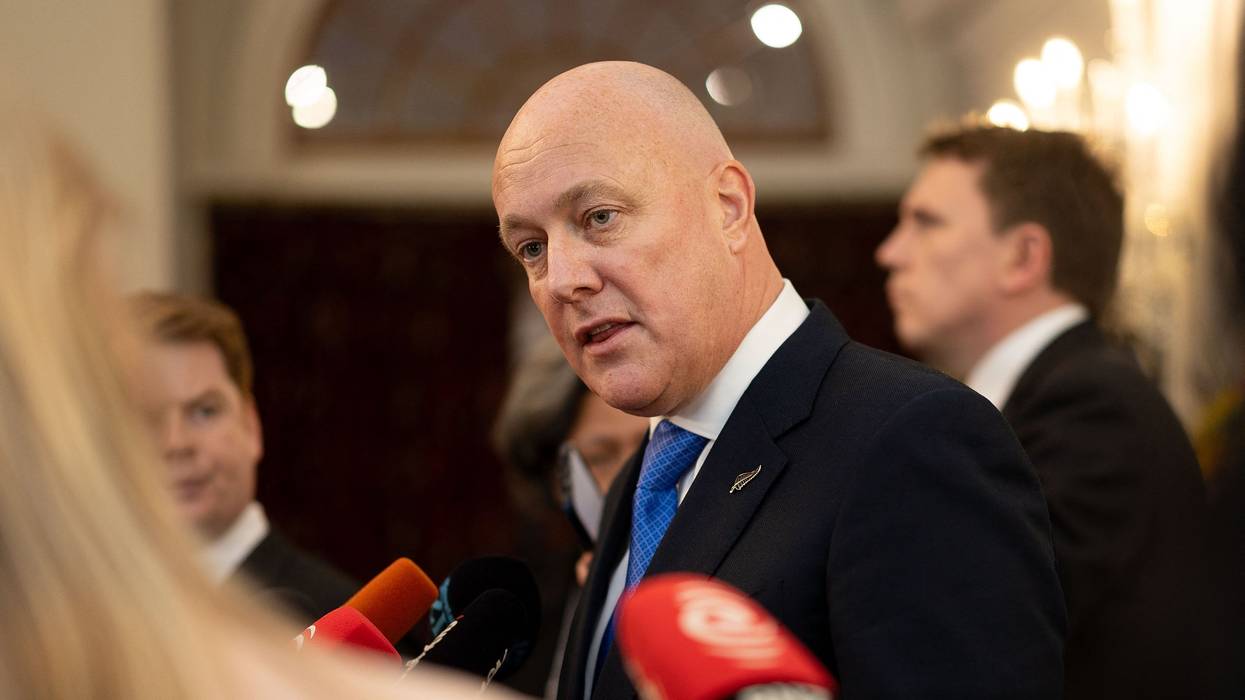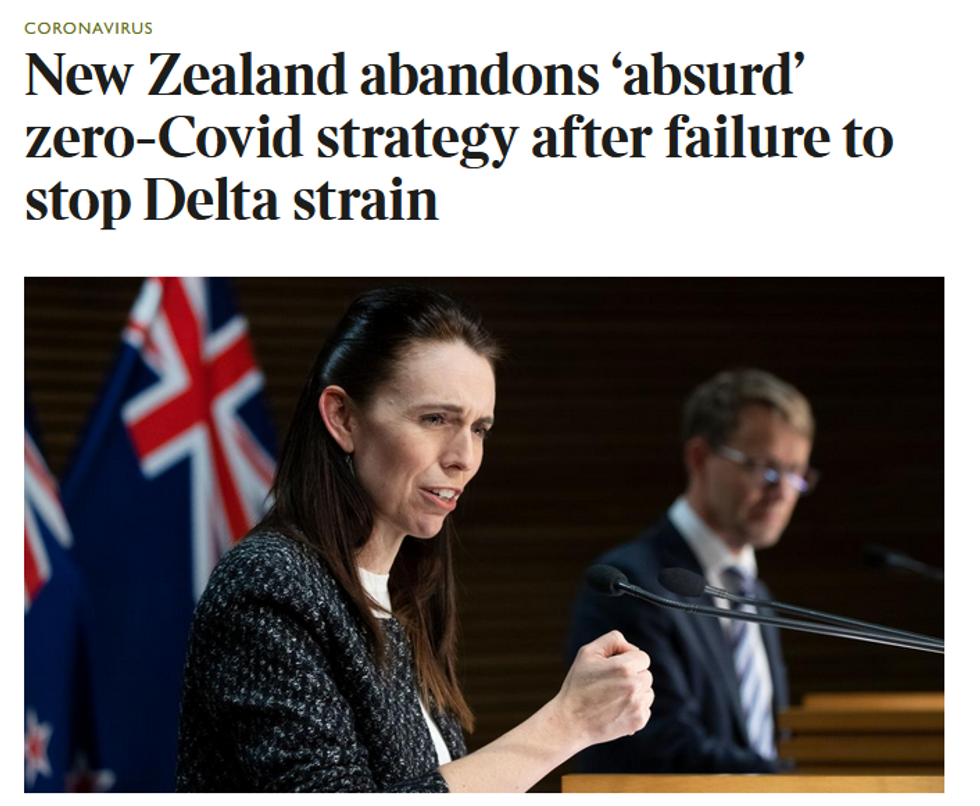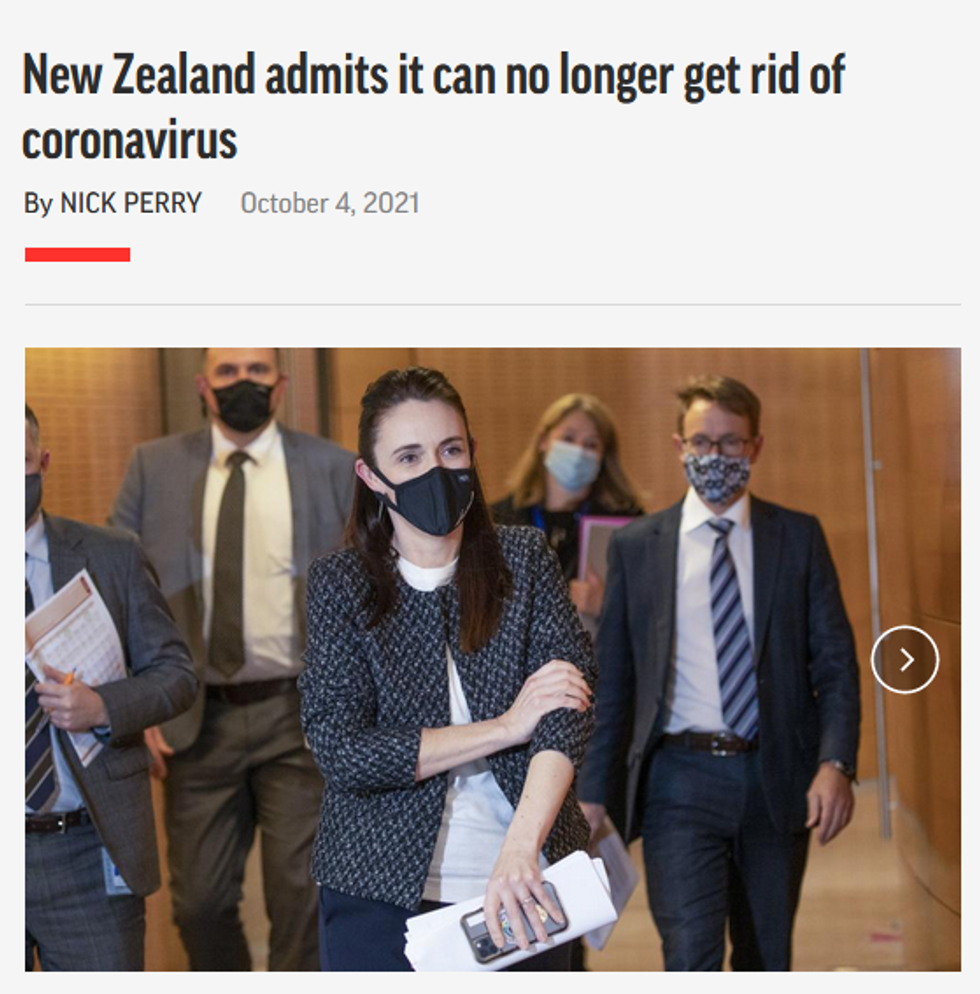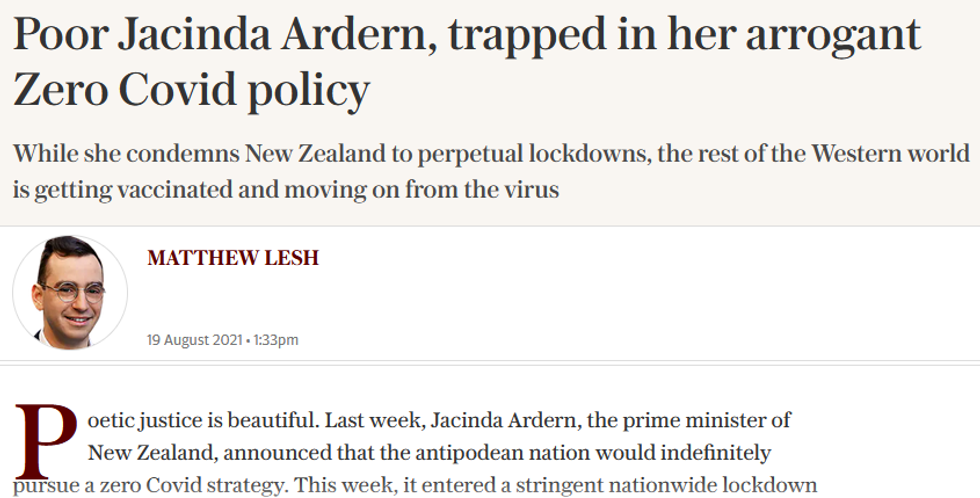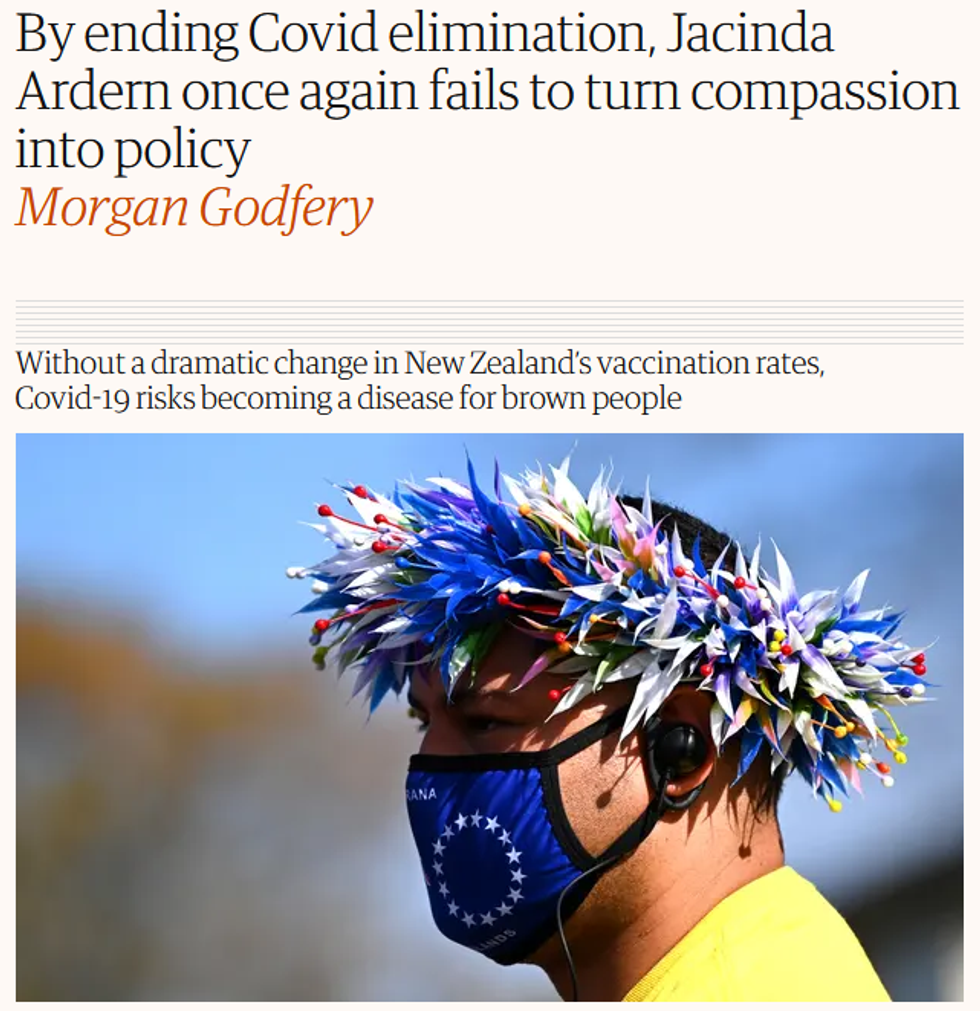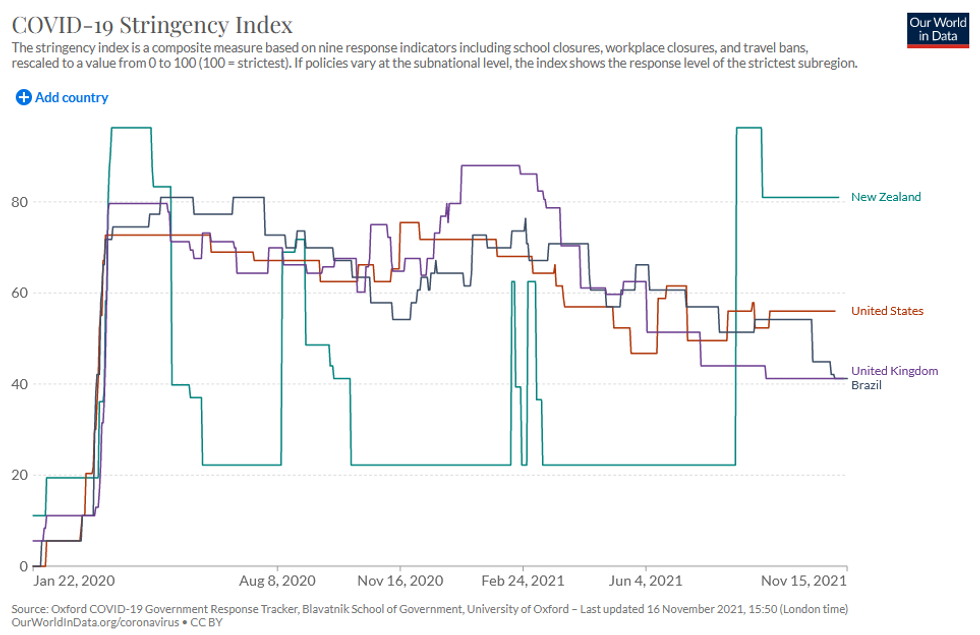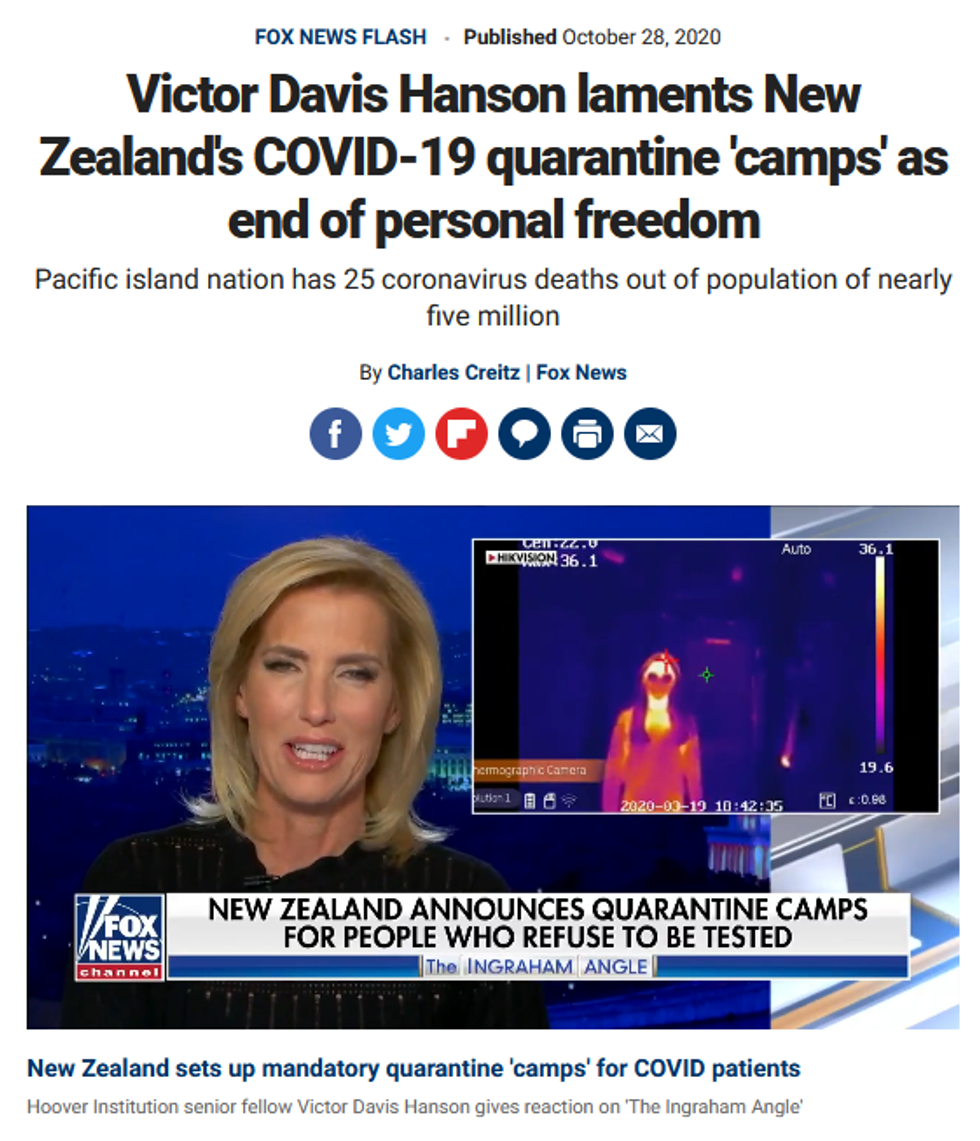
New Zealand's "absurd" Covid strategy (London Times, 10/4/21) resulted in a pandemic death toll 330 times smaller than Britain's--while avoiding Britain's 2020 economic crash.
The London Daily Mail (10/4/21) reported on New Zealand's transition in more triumphalist terms, stating:
New Zealand has finally acknowledged what most other countries realized long ago, that it cannot completely eradicate Covid.
Jacinda Ardern is abandoning her draconian "Zero Covid" strategy after admitting she cannot stop the spread of the Delta variant with harsh lockdown measures and aggressive contact tracing.

AP (10/4/21) acknowledged, "While other nations faced rising death tolls and disrupted lives, New Zealanders went back to workplaces, school yards and sports stadiums safe from any community spread."
The Associated Press's "New Zealand Admits It Can No Longer Get Rid of Coronavirus" (10/4/21) similarly framed New Zealand's previous zero-Covid strategy as an unusual deviation that would inevitably fail, although it acknowledged that the elimination strategy worked "remarkably well":
New Zealand's government acknowledged Monday what most other countries did long ago: It can no longer completely get rid of the coronavirus.
Since early in the pandemic, New Zealand had pursued an unusual zero-tolerance approach to the virus through strict lockdowns and aggressive contact tracing.
CNBC (10/5/21) reported that New Zealand has "become the latest country to abandon a zero-Covid strategy" and has been "notoriously strict in its tackling of Covid," citing the time Ardern put the country in a strict lockdown after one coronavirus case was detected (the first caused by the Delta variant) in August.
"Notorious" is an interesting way to describe New Zealand's performance, considering how frequently it featured on numerous lists of countries credited for handling the pandemic the best compared to the rest of the world prior to the outbreak of the Delta variant (Newshub, 1/28/21; New Zealand Herald, 9/29/21; Guardian, 10/8/20).
CNBC made it seem as if New Zealand was trying to maintain zero-Covid forever, and cites experts claiming that the highly infectious Delta variant makes such approaches "futile," even though Ardern explained that New Zealand's elimination strategy was always intended to be temporary. China--with far fewer geographic and population advantages compared to New Zealand--has managed to sustain a zero-Covid approach, with less than 5,000 total deaths from the virus throughout the pandemic, in a population of 1.4 billion, with nationwide cases fading to zero in August.
Mockery and disdain
However, it is erroneous to present the shift as a failure of New Zealand's pandemic response, or to falsely caricature their initial approach as being motivated by a naive belief they could sustain it indefinitely. Rather, countries only need to pursue these measures until a sufficient number of their population are fully vaccinated. Singapore transitioned out of its zero-Covid strategy in phases after targeting an 80% vaccination rate, with the vast majority of their new cases not falling seriously ill due to being vaccinated.
Ardern explained her shift by citing the increased availability of vaccines, and stated that the decision to transition away from New Zealand's zero-Covid approach was inevitable. She said that her policy had shifted due to the greater transmissibility of the Delta variant, which makes it harder to bring cases down to zero, and announced that New Zealand will be ending national lockdowns when it reaches a 90% vaccination rate (Wired, 10/8/21).

"Poetic justice is beautiful," declared Matthew Lesh in the London Telegraph (8/19/21).
The mockery and disdain for New Zealand's pandemic response was nowhere more apparent than when it was widely reported that the country initiated a level 4 lockdown (the highest level in New Zealand) after detecting a single Delta variant case with the Delta variant on August 17 in Auckland (New Zealand's most populous city).
The London Telegraph (8/19/21) scorned New Zealand as a "once-welcoming nation" turned into a "isolated dystopia, where liberties are taken away in a heartbeat and outsiders are shunned." The paper claimed a fetishization of "zero risk" gave the state "limitless justification to interfere in our lives in the most extreme of ways." Ardern's right-wing predecessor, former Prime Minister John Key, wrote a widely shared op-ed (Stuff, 9/26/21) declaring that "the aim should no longer be to exist in a smug hermit kingdom," and not to "continue the North Korea option."
Libertarian pundit Glenn Greenwald continued this line of thought by tweeting that Australian and New Zealand officials seem "demented, oblivious to the costs of sustained isolation" because of the lockdown.
More or less normal

Morgan Godfrey warned in the Guardian (10/5/21) that shifting from a zero-Covid policy to a reliance on vaccination risks Covid-19 "becoming a disease for brown people," as vaccination rates trail among Maori and Pacific people in New Zealand.
However, what critics like Greenwald omitted was that the lockdown was initially supposed to last only three days, and that New Zealanders have not been under "sustained isolation" since their zero-Covid approach quickly stamped out the virus in previous outbreaks. In fact, plenty of people living there have pointed out that it's hard for people outside the country to grasp how normal life has been there for most of the pandemic (Guardian, 10/5/21):
For 18 months, New Zealanders were living life as if there were no pandemic. We were gathering outdoors and indoors in the thousands, mask mandates were literally a foreign concept, and business and public services were operating more or less as normal. We were watching governments that let the virus rip with a good dose of horror and, if we're honest, a modest dose of smugness.
This is not a mere anecdote. When one looks at the Covid-19 Stringency Index provided by the University of Oxford, which measures how restrictive policies are for countries by tracking various metrics like school and workplace closures, as well as travel bans, it's clear that New Zealanders have enjoyed more freedoms throughout most of the pandemic than Americans or Brazilians (where Greenwald is based). Right before the latest lockdown measures in August, New Zealanders had been living normally with not a single Covid case for six months, demonstrating that powerful measures for a brief period of time actually grant citizens more freedom, and are more effective than sustained half-measures that predominate in the US and UK.
Also omitted is that the vast majority of New Zealanders were supportive of their zero-Covid policy, as numerous polls and the Labour Party's landslide 2020 reelection confirm (ABC, 10/8/21; Otago Daily Times, 9/2/21). While economic activity is not a perfect proxy for normal living, it's worth noting that New Zealand's economy grew 1.0% in 2020, while the US's dropped 3.5% and Britain's plunged 9.8%.

Throughout most of the pandemic, New Zealand's Covid rules have been much less stringent than either the US's, Britain's or Brazil's. (Chart: Our World in Data)
Caricatured as 'Covid prison'

Fox News (10/28/20) depicted people arriving in New Zealand being required to take a Covid test before they could enter the country ass the "end of personal freedom."
Yet these facts don't stop outside commentators from condemning and caricaturing New Zealand's policy as throwing away "personal freedoms" for quarantine "camps," or falsely portraying New Zealanders as if they are languishing in a "Covid prison" (Fox News, 10/28/20; London Times, 8/22/21).
As it happens, New Zealand's decision to initiate a swift lockdown after detecting a single case is similar to how other countries adopting a zero-Covid approach, like China, handle things. And that decision was later vindicated by the discovery of even more previously undetected cases, as one detected case on August 17 turned into 63 new cases by August 25, due to the more transmissible Delta variant, along with not being able to detect more cases without additional testing (Gizmodo, 8/25/21). Since officials are supposed to revise their approach upon gaining additional information in real time, it's not a surprise or a sign of incompetence that the initial three-day lockdown was repeatedly extended upon learning of more Covid cases throughout the lockdown.
This is not to say that a zero-Covid strategy is easily replicable. Many people living in countries that pursue virus elimination strategies, like New Zealand and China, have pointed out that they both depend on "social license," or trust in their government's public health response. The general public complies with public health measures because they feel like they are working together to contain the pandemic, in addition to government action having clear rationales (Time, 10/14/21). Even if the US government possessed the technical capabilities of New Zealand and China, that doesn't mean the US would be capable of replicating their success with widespread compliance, since Americans have consistently displayed low trust and satisfaction in their government compared to New Zealand and China (Pew, 5/17/21).
Nor is it to say that New Zealanders have no criticisms of their pandemic response. Critics have charged that the Labour Party's sudden transition from an elimination to a containment strategy took place too quickly, given New Zealand's slow vaccine rollout. With children and the indigenous Maori population not having the same vaccination rates as adults and white people, this risks Covid-19 "becoming a disease for brown people" (Guardian, 10/5/21; RNZ, 8/24/21). Numerous experts have argued that herd immunity and virus eradication (which differs from virus elimination by seeking to entirely wipe out Covid-19 from the planet like smallpox) may be unrealistic goals, as Covid-19 is most likely going to be endemic like influenza, in part because other countries have not pursued New Zealand's elimination strategy (Nature, 3/18/21; Vox, 10/22/21; MedPage Today, 4/11/21).
One gets the sense that corporate media outlets in countries like the US and Britain mocking or criticizing New Zealand's pandemic response are following a "misery loves company" ethos (FAIR.org, 9/17/21). But one can simply compare New Zealand's 6.9 Covid deaths per million with the US and the UK's 2,313 and 2,131 deaths per million, respectively, to see if New Zealand should listen to the US/UK media's spiteful coverage, and to assess which governments have failed their populations by putting profits before people (BMJ, 2/4/21).


